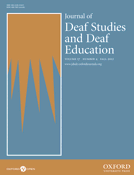
Journal of Deaf Studies and Deaf Education
Scope & Guideline
Advancing understanding in Deaf education and studies.
Introduction
Aims and Scopes
- Deaf Education Research:
The journal emphasizes research on teaching methodologies, educational practices, and interventions specifically tailored for Deaf and hard-of-hearing students, highlighting the importance of effective educational strategies. - Language Acquisition and Development:
A core focus is on language development, including the acquisition of sign language and spoken language among Deaf children, with studies investigating the impact of various interventions and familial influences on language outcomes. - Cultural and Social Perspectives:
Research exploring the cultural identity of Deaf individuals and the sociocultural dynamics within Deaf communities is prevalent, addressing issues of representation, inclusion, and social justice. - Multilingualism and Diverse Learners:
The journal investigates the experiences of multilingual Deaf learners, focusing on the challenges and strategies for supporting language access and literacy among diverse populations. - Psychological and Cognitive Aspects:
Studies examining cognitive processes, such as executive function and theory of mind in Deaf individuals, contribute to a deeper understanding of their psychological development and educational needs. - Family and Community Engagement:
Research on the role of families in the education of Deaf children, including parental involvement and community resources, is emphasized, acknowledging the importance of a supportive environment for learning.
Trending and Emerging
- Sign Language Corpus Linguistics:
Recent publications indicate a burgeoning interest in corpus linguistics related to sign languages, exploring their structure, usage, and implications for Deaf education, thus contributing to a more empirical understanding of sign languages. - Mental Health and Well-Being:
There is an increasing focus on the mental health and well-being of Deaf individuals, highlighting the importance of addressing psychological aspects alongside educational outcomes, particularly in relation to identity and social support. - Family-Centered Early Intervention:
Research on family-centered approaches in early intervention for Deaf children is gaining traction, emphasizing the role of families in fostering language development and educational success. - Technology in Deaf Education:
The integration of technology, including digital storytelling and educational apps for Deaf children, is becoming a prominent theme, reflecting the need to leverage modern tools to enhance learning experiences. - Ethics and Advocacy:
Emerging discussions surrounding ethical considerations in research involving Deaf individuals and advocacy for rights and access are increasingly prevalent, indicating a shift towards more socially responsible research practices. - Bilingual Education Models:
A notable trend is the exploration of bilingual education models that incorporate both sign language and spoken language, aiming to improve literacy and language outcomes for Deaf and hard-of-hearing students.
Declining or Waning
- Traditional Auditory Approaches:
There appears to be a waning emphasis on traditional auditory-based educational methods, such as auditory-verbal therapy, as the field increasingly recognizes the value of sign language and bilingual approaches. - Generalized Disability Studies:
Research that broadly addresses disability without a specific focus on Deaf culture or experiences may be declining, as the journal narrows its scope to more specialized studies relevant to the Deaf community. - Historical Perspectives:
While historical studies have been important, there seems to be a reduced frequency of publications focusing solely on historical accounts or demographic analyses of Deaf communities, possibly overshadowed by contemporary issues.
Similar Journals

READING AND WRITING
Fostering Knowledge in Education and LinguisticsREADING AND WRITING is a premier academic journal dedicated to exploring the interdisciplinary fields of education, linguistics, neuropsychology, and speech and hearing. Published by Springer, this journal has established itself as a leading platform for high-quality research, reflected in its impressive Q1 ranking across various disciplines in the 2023 journal quartiles. Covering significant advancements from its inception in 1989 through to 2024, READING AND WRITING emphasizes the critical interplay between reading and writing skills and their cognitive, linguistic, and educational implications. With its broad scope and commitment to advancing knowledge, this journal is invaluable for researchers, educators, and students aiming to deepen their understanding of literacy development and its impact on learning and communication. Although it operates without an open access model, the journal's rigorous peer-review process assures that published articles meet the highest academic standards, making it a reliable source of novel insights in these interconnected fields.
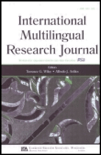
International Multilingual Research Journal
Advancing multilingual scholarship for a global audience.The International Multilingual Research Journal, published by Routledge Journals, Taylor & Francis Ltd, is a leading platform for the dissemination of innovative research in the fields of Education and Linguistics. With an impact factor reflecting its rigorous academic standards and a Q1 ranking in both relevant categories, this journal is dedicated to advancing the understanding of multilingualism and its implications globally. It serves as an essential resource for researchers, educators, and practitioners who seek to explore the complexities of language and learning across diverse cultural contexts. Since its inception in 2010, the journal has converged a wealth of scholarly articles that address contemporary issues in language use and pedagogical practices. The journal adheres to the highest research integrity standards and promotes open dialogue among scholars, making it a vital tool for those engaged in this expanding field. With its strong positioning in prestigious databases like Scopus, the International Multilingual Research Journal is committed to enriching the academic community and fostering interdisciplinary collaborations.
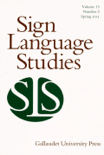
Sign Language Studies
Unveiling the complexities of signed communication.Sign Language Studies is a prestigious peer-reviewed journal dedicated to advancing the field of sign language research and the linguistic studies surrounding it. Published by Gallaudet University Press, this journal stands out in the realms of Linguistics and Language, being classified within the Q2 category as of 2023, which underscores its influence and relevance within academic circles. Operating under the ISSN 0302-1475 and E-ISSN 1533-6263, the journal has a remarkable Scopus ranking that positions it in the top 20% within the disciplines of Arts and Humanities and Social Sciences, attesting to the high quality and impact of its publications. Spanning a comprehensive timeline from 2002 to 2024, Sign Language Studies invites researchers, professionals, and students to engage with cutting-edge research, theoretical frameworks, and practical studies that contribute to our understanding of sign languages, their structure, use, and the communities they serve. This makes it an essential resource for those committed to the exploration and appreciation of sign language within both linguistic and social contexts.

Eurasian Journal of Applied Linguistics
Fostering Interdisciplinary Dialogue in Language StudiesThe Eurasian Journal of Applied Linguistics, published by Hacettepe University, ELT Department, is a distinguished open-access journal that has been contributing to the fields of linguistics and language education since 2015. With a focus on bridging cultural and linguistic understandings across Eurasia, this journal provides a platform for researchers, educators, and practitioners to share cutting-edge studies, innovative pedagogical strategies, and insightful analyses. The journal holds notable Scopus rankings within the Language and Linguistics (Rank #155/1088, 85th Percentile) and Education (Rank #696/1543, 54th Percentile) categories, evidencing its growing impact within the academic community. As it prepares to converge into a new phase from 2018 to 2024, the Eurasian Journal of Applied Linguistics aims to uphold its mission of fostering interdisciplinary dialogue and advancing knowledge in applied linguistics and its related fields.

Journal of Language and Literacy Education
Exploring the Future of Language and Literacy in Diverse CommunitiesThe Journal of Language and Literacy Education, published by the University of Georgia, College of Education, is an essential resource for researchers, educators, and students engaged in the dynamic field of language and literacy. With an ISSN of 1559-9035 and a commitment to open discussions on contemporary educational practices, this journal aims to bridge the gap between theory and practice, fostering innovative pedagogical approaches that resonate with diverse learning communities. Operating from 427 Tucker Hall, Athens, GA 30602, the journal holds a notable position in the Social Sciences - Education category, ranked at #854 out of 1543 in Scopus, with a 44th percentile standing. Spanning a converged period from 2020 to 2024, it offers a platform for cutting-edge research, critical reviews, and discourse surrounding language acquisition, literacy development, and educational strategies. Engaging with this journal not only enriches academic pursuits but also elevates professional practices within the field.
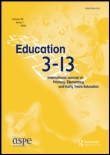
Education 3-13
Uncovering the future of learning through rigorous research.Education 3-13, published by Routledge Journals, Taylor & Francis Ltd, stands as a vital resource in the fields of education and life-span studies. With an ISSN of 0300-4279 and an E-ISSN of 1475-7575, this esteemed journal has consistently disseminated high-quality research since its inception in 1973, with coverage extending through to 2024. It boasts a respectable Q2 quartile ranking in Education and a Q3 ranking in Life-span and Life-course Studies as of 2023, reflecting its influence and relevance within the academic community. With its Scopus ranks showing it placed in the 58th percentile in Education, and the 40th percentile in Life-span and Life-course Studies, Education 3-13 is pivotal for scholars and practitioners aiming to explore innovative pedagogical approaches and the implications of developmental research. This journal promotes scholarly dialogue and showcases cutting-edge studies that contribute to the advancement of educational practices, making it an indispensable reference for researchers, educators, and students alike.
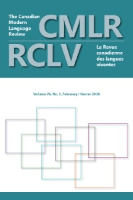
CANADIAN MODERN LANGUAGE REVIEW-REVUE CANADIENNE DES LANGUES VIVANTES
Fostering Academic Excellence in Language StudiesCanadian Modern Language Review - Revue Canadienne des Langues Vivantes is a leading scholarly journal published by University of Toronto Press Inc, focused on the field of linguistics and language education. With its ISBN 0008-4506 and E-ISBN 1710-1131, this journal has established itself as a significant contributor to research in both the education and linguistics categories, currently holding a Q3 classification in Education and a Q2 in Linguistics and Language as of 2023. It boasts an impressive Scopus rank within the top percentiles for both fields, ensuring its validity and relevance among contemporary academic discourse. The journal's emphasis on publishing high-quality research aims to advance understanding and promote effective pedagogical practices, making it an essential resource for researchers, educators, and students passionate about modern languages. The Canadian Modern Language Review has been active from 1996 to 2024, facilitating discussions that bridge linguistic theory and educational practices, although it maintains a subscription-based access approach. Situated in Toronto, Canada, at the Journals Division, 5201 Dufferin St, Downsview, ON M3H 5T8, this journal invites contributions that explore innovative methodologies and critical issues in the field, fostering an environment of academic rigor and collaboration.
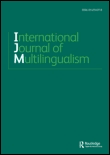
International Journal of Multilingualism
Elevating the study of languages in a global context.Welcome to the International Journal of Multilingualism, a leading platform dedicated to advancing the field of linguistics and language studies. Established by ROUTLEDGE JOURNALS, TAYLOR & FRANCIS LTD and housed in the United Kingdom, this journal has rapidly ascended to a prestigious Q1 quartile status in both the Linguistics and Language categories as of 2023, ranking in the top 4% across related disciplines. With a remarkable Scopus ranking of #35 in Arts and Humanities and #38 in Social Sciences, it is recognized for publishing high-quality, impactful research that spans a diverse array of multilingual topics. The journal thrives on its commitment to examining the complexities and dynamics of multilingualism in contemporary society, making it an essential resource for researchers, professionals, and students alike. Although Open Access options are not currently available, the journal's rigorous peer-review process ensures that each publication contributes valuable insights into the field. Since its inception in 2004, the International Journal of Multilingualism continues to foster academic discourse and innovation, solidifying its role as a crucial outlet for scholarly work by 2024 and beyond.

AMERICAN ANNALS OF THE DEAF
Fostering Academic Excellence in the Deaf CommunityAMERICAN ANNALS OF THE DEAF, published by Gallaudet University Press, stands as a pivotal scholarly resource within the fields of Developmental and Educational Psychology, Education, and Speech and Hearing. With a commitment to advancing research and discourse surrounding deafness, the journal has been a cornerstone in the field since its inception in 1946. Recognized with a 2023 Q3 category quartile ranking across multiple disciplines, it continues to make significant contributions to knowledge and understanding in the deaf community and related educational practices. While currently not offering an Open Access model, AMERICAN ANNALS OF THE DEAF remains vital for those seeking to explore the complexities of deaf education and communication, making it a valuable asset for researchers, practitioners, and students alike.
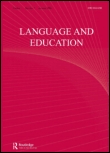
Language and Education
Connecting Language Proficiency with Effective Teaching StrategiesLanguage and Education is a leading academic journal published by Routledge Journals, Taylor & Francis Ltd, specializing in the intersection of language studies and educational practices. With an impressive Q1 ranking in both Education and Linguistics and Language categories for 2023, it stands out as a crucial resource for researchers, educators, and industry professionals. Covering a wide array of topics pertinent to language acquisition, pedagogical methodologies, and culturally responsive education, this journal supports rigorous scholarship in the field. While not currently offering open access options, its contributions are vital for advancing knowledge and fostering innovation across disciplines. The journal's long-term commitment to excellence is evidenced by its high rankings in Scopus, placing it in the 94th percentile in Language and Linguistics and the 80th percentile in Education. Since its inception in 1987, Language and Education has not only tracked the evolving landscape of language education but has also actively shaped it, making it an indispensable tool for anyone invested in educational research and practice.